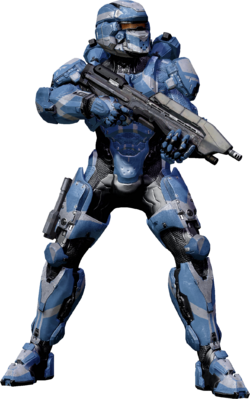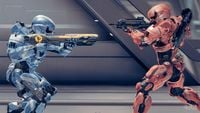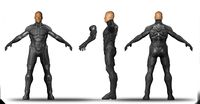MJOLNIR Powered Assault Armor (GEN2): Difference between revisions
From Halopedia, the Halo wiki
No edit summary |
|||
| Line 66: | Line 66: | ||
*'''[[Z-90 Photonic Coalescence Emitter/Aegis|Hardlight shield]]''' - A shield made from [[hard light]] reverse-engineered from Forerunner technology | *'''[[Z-90 Photonic Coalescence Emitter/Aegis|Hardlight shield]]''' - A shield made from [[hard light]] reverse-engineered from Forerunner technology | ||
*'''[[Overshield]]''' - A Covenant-developed technology that strengthens the user's energy shielding system | *'''[[Overshield]]''' - A Covenant-developed technology that strengthens the user's energy shielding system | ||
*'''[[ | *'''[[Series_12_Single_Operator_Lift_Apparatus|S-12 SOLA jumpjet pack]]''' - Mitigates gravity, allowing mobility over challenging terrain | ||
*'''[[Promethean vision]]''' - A sonar-like Forerunner visual enhancement system that displays movement through solid objects | *'''[[Promethean vision]]''' - A sonar-like Forerunner visual enhancement system that displays movement through solid objects | ||
*'''[[M2705 Regenerative Kinetic Dispersal Field|Regeneration field]]''' - Applies a force to remove hostiles from the presence of the user and then temporarily appropriates armor system functions, targeting biological and combat vitality-oriented armor functions in order to heal the user and repair the armor | *'''[[M2705 Regenerative Kinetic Dispersal Field|Regeneration field]]''' - Applies a force to remove hostiles from the presence of the user and then temporarily appropriates armor system functions, targeting biological and combat vitality-oriented armor functions in order to heal the user and repair the armor | ||
Revision as of 09:45, February 11, 2015

The MJOLNIR Powered Assault Armor [GEN2] is the second system-wide generation of the MJOLNIR Powered Assault Armor. GEN2 introduces many improvements to the suit's core architecture, specifically tailored for use by the SPARTAN-IV supersoldiers.[1][2][3]
Background
GEN2 was developed by the Materials Group as a response to the SPARTAN-IV project. The armor was designed to compensate for the SPARTAN-IVs' inferior physical augmentations in comparison to the previous two generations. As a result, the armor multiplies the strength of its wearer significantly more than the first-generation suits, granting the SPARTAN-IVs roughly equal strength as their GEN1-equipped predecessors while wearing the suit.[3] The GEN2 suit is also lighter and stronger in construction than the first-generation MJOLNIR line.[3][1][2]
The GEN2 armor incorporates new ad hoc modification systems which allow the armor to use armor abilities, tactical packages, and support upgrades. GEN2 is produced by at least seven manufacturers, both within the military and among private contractors. Production of some GEN1 variants was shifted between corporate entities, while other contracts were transferred from the military to private industries.[1] Like its GEN1 predecessors it is backwards compatible (through hardware and firmware upgrades) with previous armor systems, including the Mark V, the Mark VI, and the MJOLNIR variant of the ODST armor.[4]
While the suit's primary production model bears less significance than in the previous MJOLNIR generations due to GEN2's more distributed design philosophy, the Materials Group's Warrior variant is officially considered the mainline model of the GEN2 armor. Another prevalent model is the Recruit variant, which is issued to all SPARTAN-IVs upon induction.[5]
Armor variants and upgrades
- Air Assault - Utilized primarily by ONI security personnel on Earth's and Luna's space elevators and skyhooks.[note 1]
- Athlon - A variant used in combat training exercises[6]
- Aviator - Required for use by Spartan F-41 Broadsword pilots
- CIO - A variant for Counter-Intelligence Operators
- Centurion - A variant for operational planning and situational awareness
- Commando - A variant for special operations, upgraded from GEN1
- Deadeye - Designed for snipers
- Defender - Designed for general area denial and tactical defensive abilities
- EOD - A variant designed to facilitate explosive ordnance disposal, upgraded from GEN1[7]
- Enforcer - A variant designed for remote security base detail
- Engineer - A variant designed for repairing and reconfiguring technology in combat[8]
- EVA - A variant designed for extra-vehicular activity, upgraded from GEN1
- FOTUS - A variant based on Forerunner technology[9]
- GUNGNIR - Upgrade of GEN1 model developed by Project GUNGNIR
- HAZOP - A variant for environments considered too hazardous for standard equipment, upgraded from GEN1
- Helioskrill - A variant designed by a Sangheili prodigy
- Infiltrator - A variant designed for stealthy infiltration of enemy territory
- LOCUS - A variant ideal for its resiliency
- Mark V - Upgraded to function with the MJOLNIR [GEN2] suite
- Mark VI - Upgraded to function with the MJOLNIR [GEN2] suite
- Mark VII - One of the first MJOLNIR [GEN2] armor created
- Nightfall - A variant used on inhospitable worlds
- ODST - Upgraded to function with the MJOLNIR [GEN2] suite
- Oceanic - Designed for combat in waterfront areas
- Orbital - A variant designed for EVA activity
- Operator - A variant designed to optimize vehicle operation, upgraded from GEN1[8]
- Pathfinder - A variant designed for missions in intel-poor environments[7]
- Pioneer - A variant designed for missions in unfamiliar, hostile environments[8]
- Prefect - A variant based on Forerunner personal armor[4]
- Protector - Variant designed for VIP security
- Raider - A variant designed with Samurai-like aesthetics for intimidation of hostiles
- Ranger - A variant designed for remote operatives engaging in hostile environmental conditions
- Recon - A variant designed for stealth reconnaissance operations, upgraded from GEN1
- Recruit - Issued to all SPARTAN-IV recruits prior to qualification for specialized models[7]
- Ricochet - A variant designed for use in Ricochet combat training exercises[4]
- Rogue - A variant designed for extended solo operations, upgraded from GEN1[8]
- Scanner - A variant designed to aid search-and-rescue teams
- Scout - A variant designed for scouting operations, upgraded from GEN1
- Soldier - A variant with extra storage space designed for battlefield support
- Stalker - A variant designed to aid in covert shadowing of a target, derived from Jiralhanae Stalker stealth harnesses[8]
- Strider - A variant for jaunt-combat excursions in isolated theaters
- Tracker - A variant designed to aid in long-range pursuit of targets[8]
- Vanguard - A variant designed for face-to-face enemy assaults
- Venator - A variant optimized for single-enemy combat
- Warrior - MJOLNIR's mainline armor kit
- War Master - Lethbridge Industrial's most popular and most exotic armor
- Wetwork - A variant designed for assassination operations[8]
The armor system is built to support a variety of attachments and equipment which allow it to utilize armor abilities. Some of them have been reverse-engineered from Covenant and Forerunner technology.
- Active camouflage emitter - Affords the wearer a brief period of near-invisibility in addition to scrambling nearby motion detectors
- Autosentry - A Forerunner-created support drone used to suppress enemy combatants
- Hologram module - Creates a holographic projection of the user that can draw enemy fire
- Hardlight shield - A shield made from hard light reverse-engineered from Forerunner technology
- Overshield - A Covenant-developed technology that strengthens the user's energy shielding system
- S-12 SOLA jumpjet pack - Mitigates gravity, allowing mobility over challenging terrain
- Promethean vision - A sonar-like Forerunner visual enhancement system that displays movement through solid objects
- Regeneration field - Applies a force to remove hostiles from the presence of the user and then temporarily appropriates armor system functions, targeting biological and combat vitality-oriented armor functions in order to heal the user and repair the armor
- Repel - Flash-freezes a small area, causing considerable harm to nearby personnel and equipment
- Seeker drone - An explosive homing drone
- Stun blast - Creates a short-range electromagnetic pulse (EMP) which interferes with all electronic equipment within the radius of the pulse
- Teleport - Allows near-instantaneous transport over short distances
- Thruster pack - A booster pack used to propel the wearer forward or to either side
Armor components
- Biofoam injectors: Allow for physical injuries to be sealed and repaired without the use of external medkits
- Energy shielding: A protective barrier that surrounds the armor and protects the user from harm
- Inner skinsuit: The inner skinsuit is made of a moisture-absorbing synthetic material linked to an environmental control computer and the occupant's neural interface. It controls the suit's temperature and actively changes how the suit fits the user.[10]
- Compact fusion reactor: The fusion reactor is the most essential part of the MJOLNIR system, as it provides power to all equipment on the MJOLNIR armor - the reactor is built into the suit and allows for nearly unlimited movement. [GEN2]'s fusion reactor is installed at the back of the torso carapace.[11]
- Magnetic weapon holder strips: The MJOLNIR armor features very small, yet powerful magnets placed on the legs, waist, and back of the suit that are used to hold any equipment or any weapons with a magnetic property. The suit also contains a magnet system within its boots that allows its wearer to stay attached to a metal surface in zero G environments and can be toggled on or off by the wearer.
- Power supply control unit: Manages the power supply of the armor
- MJOLNIR GEN2 BIOS: The basic input/output system, standard firmware interface to the GEN2
- VISR 4.0: Up to version 4.09, these visor installments are optimized and customized to facilitate specialized tasks.[12]
- Force-multiplying circuits: Allows the user greatly enhanced reflexes and strength, improving mobility and combat effectiveness in close quarters
- Motion tracker: Shows movement of friendly and enemy units within the system's radius
- Pressure seal: The pressure seal is a vital component to the MJOLNIR system, it keeps the system airtight, underwater or in space. The seal is very strong and will only break under extreme pressure, such as in a high velocity impact or when the hydrostatic gel has been over pressurized.
- Support upgrades: These customized and specialized upgrades allow combat advantages by modifying the core and periphery systems of the GEN2.
- Sprint module: Unlike previous armor systems, MJOLNIR GEN2 has a built-in sprint module that allows the user to run at faster speeds by overriding safety protocols.[1] It is functionally similar to the version developed by Catherine-B320 of NOBLE Team, which saw widespread deployment across Reach in the planet's final days.[13]
- Tactical packages: These customized and specialized packages allow combat advantages by modifying the core and periphery systems of the GEN2.
- Titanium nanocomposite bodysuit: Sandwiched between the external armor and the internal padding is a thick armored bodysuit. The bodysuit is made of a nonrigid titanium-based material, making it very strong and yet very flexible. The suit has numerous functions, small but vital to the safety and survival of the wearer. It also serves as another layer of protection against ballistics attacks and is coated with a heat-resistant material to disperse heat from plasma weapons. Many components of the GEN2's titanium bodysuit are conspicuously fashioned after the shape of human musculature; this was less prominent in previous MJOLNIR generations. Portions of the bodysuit also share their color with the external armor plating, a feature not present in the GEN1 MJOLNIR.
- Integrated thruster system: Newer GEN2 suits are equipped with an array of shoulder- and back-mounted thrusters, increasing a Spartan's mobility in the field and presumably in vacuum environments.[14] The system, which was added as part of a series-wide update, partly alleviates the need to use an external thruster unit or jetpack; however, it provides only limited thrust and as such does not fully replace external thrust apparatuses.[15] Integrated thrusters saw use in combat as early as May 2558.[16]
Trivia
- The way the GEN2 armor is equipped by UNSC Infinity's dedicated machinery onto its wearer is reminiscent of Iron Man armor in the Marvel Cinematic Universe and Tychus Findlay's CMC powered armor in Starcraft II.
- All non-essential SPARTAN-IV NPCs in Halo 4 wear full Recruit armor with Ricochet gauntlets and the Pioneer visor with steel as their suits' primary color and gold as the secondary color.
- SPARTAN-IV Tedra Grant field tested several early [GEN2] models.[17]
Gallery
Fireteam Majestic wearing [GEN2] undersuits.
Two Soldier-clad SPARTAN-IVs engaged in an Infinity Slayer match.
List of appearances
- Halo: Glasslands (First appearance)
- Halo: The Thursday War
- Halo 4 (First identified as GEN2)
- Halo: Spartan Assault
- Halo: Initiation
- Halo: Escalation
- Halo 2 Anniversary
- Halo: Spartan Strike
- Halo 5: Guardians
Note
- ^ To avoid unnecessary clutter caused by redundant citations, all subsequent entries are cited using the Halo 4 Spartan Armor menu.
Sources
- ^ a b c d Halo 4: ORDNANCE + ARMOR
- ^ a b Game Informer: May 2012
- ^ a b c Frank O'Connor interview during San Diego Comic-Con 2012 1:15 - 2:10
- ^ a b c Rooster Teeth Expo 2013
- ^ Halo 4, Spartan Armor menu descriptions
- ^ Halo 5: Guardians multiplayer beta trailer
- ^ a b c Halo 4 Limited Edition Contents
- ^ a b c d e f g : The Halo Bulletin 8.15.12
- ^ : The Halo Bulletin 7.25.12
- ^ Halo: The Fall of Reach, page 71, (2001 edition) page 81, (definitive edition) page 90 (2010 edition)
- ^ The Halo Bulletin 9.24.14
- ^ Halo 4 - All 17 Visor Colors, Master Chief Helmet & Griffball!
- ^ Halo: Reach game manual
- ^ YouTube: Halo 5: Guardians Multiplayer Beta: Behind the Scenes
- ^ Halo Waypoint: UNSC Jet Pack
- ^ Halo: Escalation Issue 11
- ^ Halo 4: The Essential Visual Guide
![The Mark VII, the first model in the [GEN2] line.](https://halo.wiki.gallery/images/thumb/d/df/Naomimarkvii.jpg/84px-Naomimarkvii.jpg)
![The HUD of the [GEN2] armor.](https://halo.wiki.gallery/images/thumb/4/4d/H4-Selecting_Ordnance_Speed_02.jpg/200px-H4-Selecting_Ordnance_Speed_02.jpg)
![Fireteam Majestic wearing [GEN2] undersuits.](https://halo.wiki.gallery/images/thumb/b/b4/H4_SOS1E1_Spartan_IV_Hologram.jpg/200px-H4_SOS1E1_Spartan_IV_Hologram.jpg)

![Fireteam Majestic in their [GEN2] armor](https://halo.wiki.gallery/images/thumb/2/2b/Majestic_-_2.png/200px-Majestic_-_2.png)
![Shields flaring on two [GEN2] suits.](https://halo.wiki.gallery/images/thumb/4/47/H4-SpartanOps-WatcherCrawler.jpg/200px-H4-SpartanOps-WatcherCrawler.jpg)

![Concept art of the MJOLNIR [GEN2] skinsuit for male wearers.](https://halo.wiki.gallery/images/thumb/b/b0/H4-Concept-Undersuit-Male.jpg/160px-H4-Concept-Undersuit-Male.jpg)
![Concept art of the female [GEN2] skinsuit.](https://halo.wiki.gallery/images/thumb/2/21/H4-Concept-Undersuit-Female.jpg/80px-H4-Concept-Undersuit-Female.jpg)
